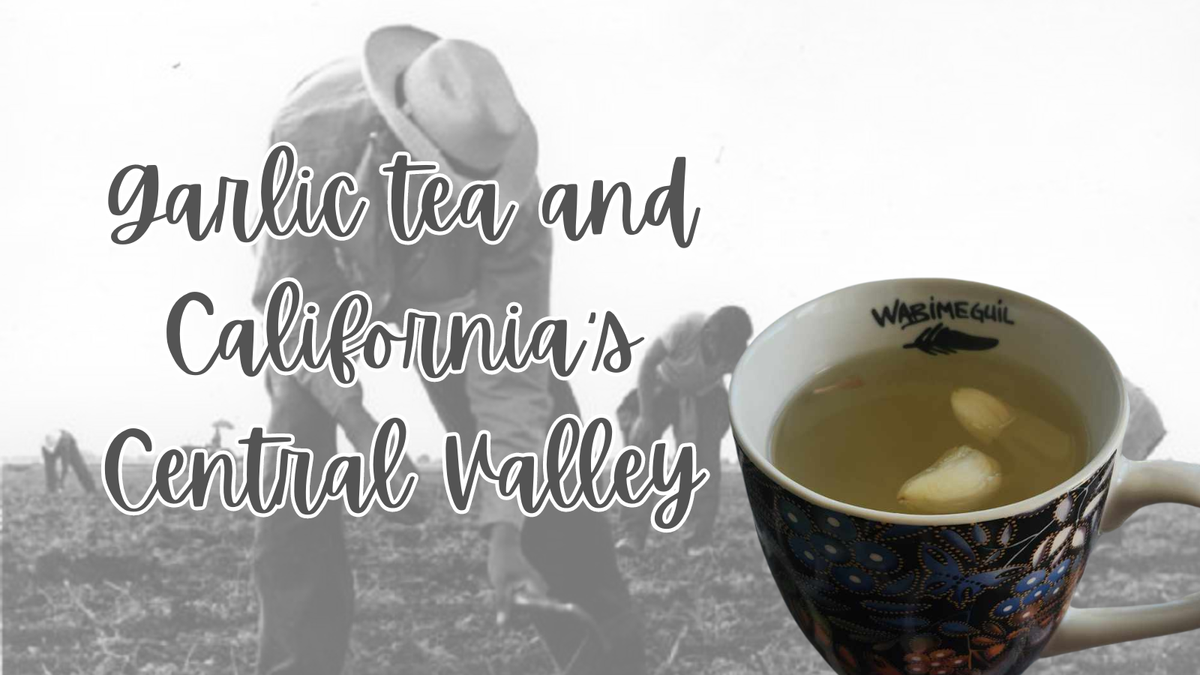Garlic tea

To make garlic tea, take two cloves of garlic and either smash them in the bottom of your cup or cut them in half. Pour in boiling water, add honey and lemon. Graciela says that you can add a stick of cinnamon too if you like. Graciela was one of my drivers when I spoke at the University of California at Santa Cruz last week and she grew up in California's central valley where much of the state's garlic is produced. The things that we consume always connect us with the people involved with those products, but most of the time that connection is theoretical. Now I have a face and a story to put alongside my connection with the migrant farm labour of California's central valley.
It's been a little while since I wrote to you about tea and as with all of these ephemera posts, you can share the email with anyone who might be interested but the essay on the website will be locked for subscribers only. I just wanted to tell you about this garlic tea and Graciela. She was born in the US, but her parents migrated to the Central Valley from Mexico. It turned out that they were from nearby towns in Mexico but didn't meet until they lived in California. Graciela found that pretty funny. I don't think he's a garlic farmer, honestly I don't remember what he does, but he does like garlic and it's a staple tea in their household. She assured me that the flavour of the garlic wasn't strong but when I mashed two garlic cloves in the bottom of my cup at home a few days later I wasn't sure.
The Central Valley in California is some 400 miles long and runs from Redding in the north through Sacremento, Modesto, and Fresno before the southern tip just past Bakersfield, which you may remember from Grapes of Wrath. Steinbeck's book features white farmers, disparagingly called Okies, who fled the dustbowl. The Joads first saw the Central Valley from the town of Tehachapi, then they went through Bakersfield before stopping in their first Hooverville, a government encampment, and continued their search for work north to Tulare where they stayed in a boxcar camp.
There are currently about 332,000 undocumented workers and family members in the Central Valley. One out of five children have at least one undocumented parent. I don't know the status of Graciela's parents, but I hope they are safe whatever that status is. The descendants of the Okies have been able to find a home there and blend in, but anti-immigrant sentiment has been escalating with the resultant incarceration of visibly racialized people. One interesting thing to think about, as you consider the increasing raids on undocumented people in the Southwest agricultural states is that prison labour is very cheap and that agricultural work is skilled labour. Let that steep for a few minutes.
I had a great time at UCSC. It was one of the few times that my audience has been mostly racially marginalized people and the things I talk about land differently in those rooms. It isn't that I say anything different, my talks generally centre around surviving together and I use three Anishinaabe stories to highlight three phases of that survival. It's that the things I say mean different things in those rooms, instead of being heavy they sound like possibility because it is our liberation I am talking about. Our futures.
The tea wasn't bad. It did taste more like garlic than Graciela seemed to think, but maybe she's just used to it. And it does not go well with sweets. It's definitely a cheese and toast kind of tea.
